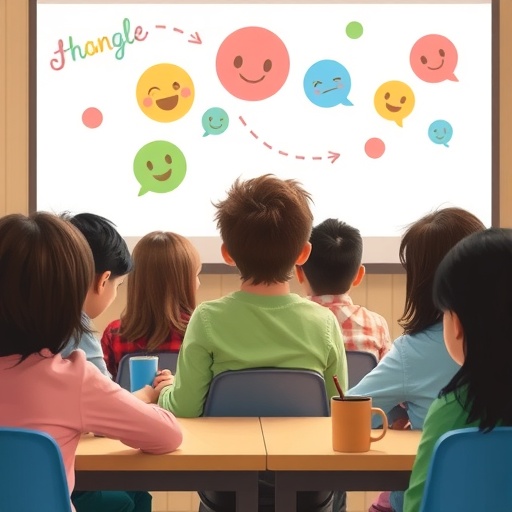In the ever-evolving landscape of educational practice, a paradigm shift has emerged, emphasizing the significance of socio-emotional learning (SEL) within 21st-century education. Researchers, Nanda, Satapathy, and Panda, delve into the multifaceted layers of SEL and its profound impact on both teachers and students in their recent systematic review published in “Discover Education.” This extensive analysis offers a comprehensive look at how socio-emotional competencies can foster an enriching educational environment aimed at preparing students for the complexities of modern life.
Socio-emotional learning encompasses the processes through which individuals, particularly students, develop the skills to manage emotions, establish positive relationships, and make responsible decisions. As society increasingly acknowledges the role of emotional intelligence in achieving personal and professional success, educational institutions around the globe are integrating SEL into their curricula. This transition reflects a broader understanding that cognitive skills alone are insufficient for thriving in today’s world.
The systematic review explores how teachers perceive the importance of SEL in the classroom. Educators are recognizing that fostering an emotionally supportive environment can significantly enhance students’ engagement and motivation. When teachers prioritize socio-emotional competencies, they not only nurture better academic performance but also cultivate essential life skills that prepare students for future challenges. This pedagogical shift indicates a crucial understanding of the holistic development of learners.
Furthermore, the review highlights student perspectives on SEL, revealing that many learners feel more empowered and confident when their emotional needs are met in the classroom. Students express a desire for opportunities to practice social skills, build resilience, and navigate peer dynamics. These insights reveal a gap between traditional educational approaches and the evolving expectations of students, urging educators to adapt their methodologies to align with these demands.
Central to the findings is the realization that effective SEL implementation requires well-structured teacher training and ongoing professional development. The review suggests that equipping educators with the proper tools and strategies to integrate SEL effectively is paramount. Teachers who are trained in SEL are not only better prepared to manage classroom dynamics but are also more adept at creating individualized learning experiences that resonate with diverse student populations.
Moreover, the authors outline several best practices for successful SEL integration. These include the incorporation of reflective practices in the classroom, which allow students to ponder their emotions and responses to various situations. Discussions that encourage empathy and understanding among peers also play a pivotal role in reinforcing social connections and dismantling barriers to communication, which are often sources of conflict in educational settings.
The review further discusses the role family and community engagement play in reinforcing SEL principles. It emphasizes that collaboration between educators and families enhances the effectiveness of socio-emotional learning initiatives. When parents and guardians are informed and involved, they can continue the conversation at home, providing a consistent support system for students. This collaborative framework requires investment in resources and programs that facilitate communication and partnership between schools and families.
In an age where technology pervades every facet of life, the review examines how digital platforms can support SEL. Online tools and resources that promote social-emotional learning are becoming increasingly available, providing educators with innovative strategies to reach and engage their students. However, the authors also caution against the potential pitfalls of technology, such as cyberbullying, underscoring the need for critical media literacy as part of the SEL curriculum.
As educational systems worldwide grapple with the aftermath of the COVID-19 pandemic, the relevance of SEL has never been more pronounced. The emotional toll experienced by students during this period has highlighted the necessity for schools to prioritize mental health and emotional well-being. The review advocates for a shift not just in education policy but in the overall approach towards student care, emphasizing that SEL is no longer an optional component but a fundamental necessity.
The findings from this systematic review contribute to a growing body of evidence advocating for the holistic development of students. As education continues to advance, so must our understanding of the intertwined relationship between academic success and socio-emotional competencies. Nanda, Satapathy, and Panda’s research is a clarion call for educators, policymakers, and communities to embrace a paradigm that recognizes the critical nature of SEL in shaping the future workforce and informed citizens.
In summary, Nanda and colleagues have shed light on an essential aspect of modern education that transcends the traditional focus on academics. Their systematic review lays the groundwork for a deeper understanding of how socio-emotional learning can significantly enhance not only the academic experience but also the lives of students as they prepare to navigate a complex and often unpredictable world. As the educational sector continues to evolve, the insights gained from this research will undoubtedly inform future practices aimed at cultivating well-rounded learners equipped to thrive in their personal and professional lives.
The integration of socio-emotional learning into educational frameworks is more than an ideal; it is a necessity that shapes the foundation of contemporary education. By embracing this paradigm shift, we can foster healthier, more engaged, and better-prepared students who are equipped to confront the challenges of the 21st century with resilience and empathy.
Subject of Research: The Importance of Socio-Emotional Learning in 21st-Century Education
Article Title: Socio-emotional learning and competencies in 21st-century education: a systematic review of teacher and student perspectives.
Article References:
Nanda, S.B., Satapathy, D., Panda, G. et al. Socio-emotional learning and competencies in 21st-century education: a systematic review of teacher and student perspectives.
Discov Educ 4, 338 (2025). https://doi.org/10.1007/s44217-025-00796-w
Image Credits: AI Generated
DOI: 10.1007/s44217-025-00796-w
Keywords: socio-emotional learning, education, 21st-century competencies, teachers, students, emotional intelligence.




